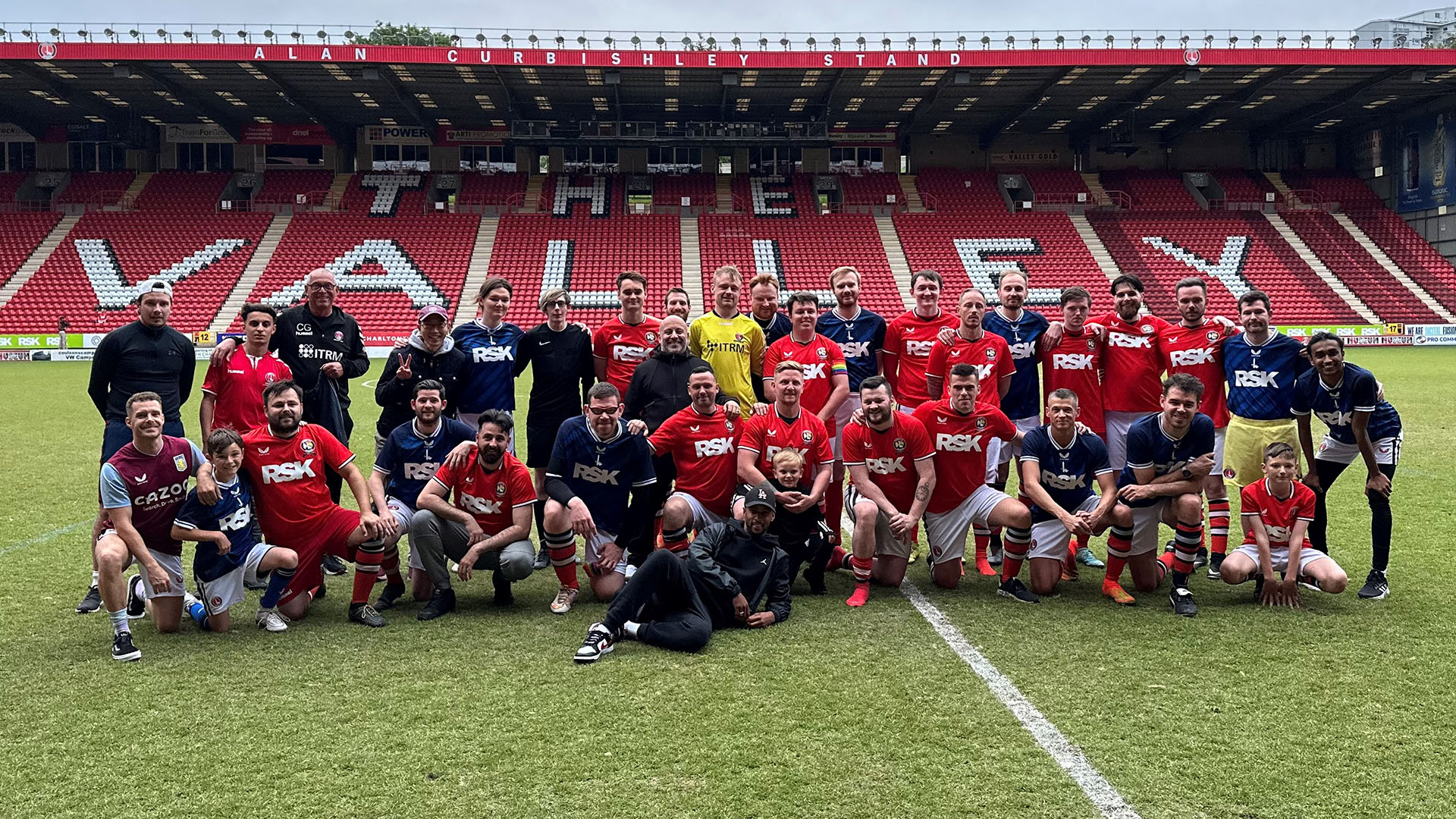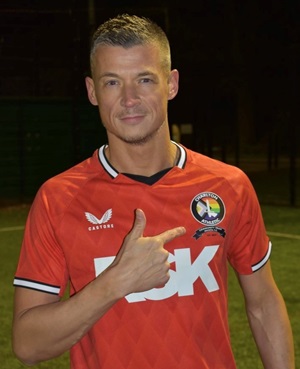
Kicking homophobia out of football
I initially joined a Sunday league football team that was LGBTQ+ inclusive in 2013 that was called Bexley Invicta. At that time, I hadn't played football for 12 years as I had struggled to come to terms with my sexual orientation and just didn't think that football had a place for me. However, I was keen to get back into it and, during an internet search one Sunday, came across this team. That said, it took me about nine months to build up the courage to go to a training session and then join the team. I really enjoyed playing on a regular basis again. I made some good friends and it was a good fit for me.
 After a few years I became player-manager for the team but we were struggling on and off the pitch with financial issues and a lack of stability. I'd always been a Charlton fan and season ticket holder as I had grown up in the local area. One day my partner Sam encouraged me to reach out to the Charlton Athletic Community Trust. We knew they did some great work locally and he convinced me that my passion could sell my vision, so I started talking to them over the course of about six months in 2016. It culminated with them hosting a tournament at the Valley which was the Charlton Athletic versus Homophobia tournament. We took part with the University of Greenwich and Charlton’s LGBTQ+ supporters’ group, the Proud Valiants. That summer they invited us to train weekly and play our home games at the Charlton training ground, giving us the stability we needed to rebuild our team.
After a few years I became player-manager for the team but we were struggling on and off the pitch with financial issues and a lack of stability. I'd always been a Charlton fan and season ticket holder as I had grown up in the local area. One day my partner Sam encouraged me to reach out to the Charlton Athletic Community Trust. We knew they did some great work locally and he convinced me that my passion could sell my vision, so I started talking to them over the course of about six months in 2016. It culminated with them hosting a tournament at the Valley which was the Charlton Athletic versus Homophobia tournament. We took part with the University of Greenwich and Charlton’s LGBTQ+ supporters’ group, the Proud Valiants. That summer they invited us to train weekly and play our home games at the Charlton training ground, giving us the stability we needed to rebuild our team.
After a good 2016/17 season, the Board of Trustees at the Charlton Athletic Community Trust unanimously agreed to formally affiliate Bexley Invicta. This was the first time a LGBTQ+ football team had received formal affiliation anywhere in Europe. Consequently, we rebranded to Charlton Invicta and had a launch day at the Valley on the 24 August 2017. Overnight we transformed from a regular Sunday league LGBT+ inclusive football team to a ground-breaking team that everybody wanted to watch. The focus was on us and there were some powerful and positive news stories. There was also some negativity in certain areas but we recognised the importance of starting conversations and raising visibility.
As a footballer, you would think success would be lifting a trophy and although that would be great, it is not really going to change mindsets and leave a lasting legacy. For me, success is having that space where people can come along and be their authentic selves and enjoy football. It's important for everyone because, sometimes, we go through struggles in life and we all just want to be accepted for who we are. We have an ethos of being ‘everyone inclusive’ - we're about breaking down barriers, not putting up walls so however you identify you are welcome to join.
For the last seven years, we have trained on a Tuesday night at the Charlton training ground next to the Charlton Athletic women's team and it has a good community vibe. Sometimes, I still think how did we do this - we've not only impacted at grassroots level, but in the professional game too. We've had training sessions with the Charlton Athletic Men's first team coaches and had players talk to us to understand the issues that affect that our community. Players are also supporting our campaigns, such as rainbow laces and football v homophobia and the club has supported London Pride in recent years.
I am proud that this is being replicated in other clubs. Bristol City affiliated the Bristol Panthers, a local LGBTQ+ team soon after us and it would surprise people to learn that Millwall also affiliated with the London Romans a few years ago. In fact, LGBTQ+ football in the UK has now grown massively because professional clubs are giving it visibility and wanting to talk about the issues. There are around 27 LGBTQ+ inclusive football teams across the UK and Ireland. I think that if you can leave a legacy that means the next generation do not have to go through the same hardships, then it is something to be proud of.
 After a few years I became player-manager for the team but we were struggling on and off the pitch with financial issues and a lack of stability. I'd always been a Charlton fan and season ticket holder as I had grown up in the local area. One day my partner Sam encouraged me to reach out to the Charlton Athletic Community Trust. We knew they did some great work locally and he convinced me that my passion could sell my vision, so I started talking to them over the course of about six months in 2016. It culminated with them hosting a tournament at the Valley which was the Charlton Athletic versus Homophobia tournament. We took part with the University of Greenwich and Charlton’s LGBTQ+ supporters’ group, the Proud Valiants. That summer they invited us to train weekly and play our home games at the Charlton training ground, giving us the stability we needed to rebuild our team.
After a few years I became player-manager for the team but we were struggling on and off the pitch with financial issues and a lack of stability. I'd always been a Charlton fan and season ticket holder as I had grown up in the local area. One day my partner Sam encouraged me to reach out to the Charlton Athletic Community Trust. We knew they did some great work locally and he convinced me that my passion could sell my vision, so I started talking to them over the course of about six months in 2016. It culminated with them hosting a tournament at the Valley which was the Charlton Athletic versus Homophobia tournament. We took part with the University of Greenwich and Charlton’s LGBTQ+ supporters’ group, the Proud Valiants. That summer they invited us to train weekly and play our home games at the Charlton training ground, giving us the stability we needed to rebuild our team.After a good 2016/17 season, the Board of Trustees at the Charlton Athletic Community Trust unanimously agreed to formally affiliate Bexley Invicta. This was the first time a LGBTQ+ football team had received formal affiliation anywhere in Europe. Consequently, we rebranded to Charlton Invicta and had a launch day at the Valley on the 24 August 2017. Overnight we transformed from a regular Sunday league LGBT+ inclusive football team to a ground-breaking team that everybody wanted to watch. The focus was on us and there were some powerful and positive news stories. There was also some negativity in certain areas but we recognised the importance of starting conversations and raising visibility.
As a footballer, you would think success would be lifting a trophy and although that would be great, it is not really going to change mindsets and leave a lasting legacy. For me, success is having that space where people can come along and be their authentic selves and enjoy football. It's important for everyone because, sometimes, we go through struggles in life and we all just want to be accepted for who we are. We have an ethos of being ‘everyone inclusive’ - we're about breaking down barriers, not putting up walls so however you identify you are welcome to join.
For the last seven years, we have trained on a Tuesday night at the Charlton training ground next to the Charlton Athletic women's team and it has a good community vibe. Sometimes, I still think how did we do this - we've not only impacted at grassroots level, but in the professional game too. We've had training sessions with the Charlton Athletic Men's first team coaches and had players talk to us to understand the issues that affect that our community. Players are also supporting our campaigns, such as rainbow laces and football v homophobia and the club has supported London Pride in recent years.
I am proud that this is being replicated in other clubs. Bristol City affiliated the Bristol Panthers, a local LGBTQ+ team soon after us and it would surprise people to learn that Millwall also affiliated with the London Romans a few years ago. In fact, LGBTQ+ football in the UK has now grown massively because professional clubs are giving it visibility and wanting to talk about the issues. There are around 27 LGBTQ+ inclusive football teams across the UK and Ireland. I think that if you can leave a legacy that means the next generation do not have to go through the same hardships, then it is something to be proud of.
